A.N. Wilson
Elmet by Fiona Mozley (John Murray, £10.99). It is difficult to convey the full horror of this spellbinding first novel. The young author, a medievalist, presumably knows the no less violent Njál’s Saga. Elmet, though set in the modern age, concerns timeless protagonists who have contrived to live outside the normal modern settings. Dad is an ex-prisoner, who earns his living as a prize-fighter — at illegally organised, very bloody bare-knuckle fights. Somehow he and his children manage to build a house on land belonging to a sinister figure called Mr Price, without any bureaucrats from the local planning office materialising to ask what he is up to. Price wants his revenge, and when his own son meets a bloody end, he exacts it. What is so memorable is the sense of utter desolation of this family. They are as outside our world as Lear and Edgar on the Heath.
Frances Wilson
Three remarkable biographies appeared this year. A.N. Wilson’s Darwin: Victorian Mythmaker (John Murray, £25) was as bold, audacious and entertaining as I knew it would be; the reviews less so. Sixty years ago, C.P. Snow condemned the existence of ‘two cultures’ who won’t speak to one another and it seems that nothing much has changed. Historians and literary critics still approach the sciences at their peril.
In the annoyingly brilliant merry-go-round that is Ma’am Darling: 99 Glimpses of Princess Margaret (4th Estate, £16.99), Craig Brown gives a new spin to royal biography, and this is a double book: a collage of Princess Margaret and a snapshot of the age that invented her.
Molly Keane, Sally Phipps’s life of her mother (Virago, £20), is as fresh and true and eccentric as any of Keane’s novels, and shows just how good biography can be in the hands of a natural writer.
Anna Aslanyan
Malacqua, Nicola Pugliese’s only novel, was discovered by Italo Calvino, who said in 1977: ‘This is a book with a meaning and a force and a message.’ Mysteriously, this small masterpiece went out of print and wasn’t reissued until 2013. Published now in Shaun Whiteside’s translation, Malacqua: Four Days of Rain in the City of Naples, Waiting for the Occurrence of an Extraordinary Event (And Other Stories, £10) is this year’s strangest and most seductive book.
Flights by Olga Tokarczuk, translated from the Polish by Jennifer Croft (Fitzcarraldo Editions, £12.99), is, to use the author’s term, a ‘constellation novel’: a coherent whole emerging from seemingly disjointed parts. Centred on travel as a 21st-century modus vivendi, it invites you to reassess the notions of home and away.
Typewriters, Bombs, Jellyfish: A Modernist Collection of Essays by Tom McCarthy (NYRB, £10.99), is remarkable for its breathtaking range of subjects, from the role of detritus in Ulysses to Zinedine Zidane’s ‘epochal head-butt’.
Clare Mulley
As a judge for the Historical Writers Association 2017 non-fiction prize, my top three books are all from that brilliant shortlist. Daniel Beer’s The House of the Dead: Siberian Exile Under the Tsars (Penguin, £12.99) uses fresh material to reveal the fascinating but little known story of the imperial gulags. This is a powerful book, underpinned by great humanity and insight.
Jerry Brotton’s remarkable This Orient Isle: Elizabethan England and the Islamic World (Penguin, £9.99) uncovers the trading, diplomatic and cultural impact of Elizabeth I’s excommunication and decision to seek new alliances beyond Europe.
Finally, switching effortlessly between the big picture and human detail, Alex von Tunzelmann has produced another excellent history of a pivotal moment in Blood and Sand: Suez, Hungary and the Crisis that Shook the World (Simon & Schuster, £9.99). Each of these books is rigorously researched, beautifully written and presents intelligent, original and compelling history that resonates powerfully today.
Jenny Colgan
All my favourite books this year were hilarious. Comedy is totally underrated in literature; it’s far harder to be funny — properly funny, not wry, or ‘theatre funny’ — than anyone realises, given that laughter is generally a shared experience.
Standard Deviation by Katherine Heiny (4th Estate, £12.99) is so comedically spot on about middle-class mores it feels unnervingly like she’s in your head. It’s one of those books that people fervently press on you.
Gail Honeyman’s Eleanor Oliphant is Completely Fine (HarperCollins, £12.99) is an oddball comedy with kindness lavishly sprinkled on top. And This is Going to Hurt by Adam Kay (Picador, £16.99) is not just laugh-out-loud funny, but precise, upsetting, and utterly sobering for anyone at all connected with the NHS.
Overrated for me was My Absolute Darling by Gabriel Tallent (4th Estate, £12.99). It’s showy, flashy and very readable, but too mulched down to a paste for my liking.
Jan Morris
I was happily intrigued by Nick Hunt’s Where the Wild Winds Are (Nicholas Brealey Publishing, £16.99), an example of the trend that has lately encouraged some particularly gifted writers to explore the profounder reaches of travel writing. Hunt’s contribution to the genre has at its epicentre not places at all but winds — five European zephyrs, whose characteristics, styles, legends, beauties and varied awfulnesses he exploits to compelling and entertaining effect.
Much my most imposing book of the year was a terrific anthology of Welsh literature down the ages called The Old Red Tongue edited by Gwyn Griffiths and Meic Stephens (Francis Bootle Publishers, £30). It is one of a series of such books dedicated to the lesser-used languages of Europe, and it covers the entire Welsh literary corpus, from the sixth century to the present, in the original and in English translation. It is almost 1,000 pages long, and I defy any sensitive reader to remain unmoved by its marvellous seductions of art, pride, pathos and imaginatiion.
Finally, a sumptuously illustrated new edition of Wordsworth’s The Prelude (Oxford, £30) seduced me into reading the whole thing aloud — well, almost the whole — when I had the house to myself.
Richard Davenport-Hines
James Stourton’s British Embassies: Their Diplomatic and Architectural History (Frances Lincoln, £40) is a perfect present. It is sumptuously illustrated, with an almost overpowering richness of colour and design, to celebrate the architecture, paintings and decoration of embassies and residences in 26 countries. Stourton begins in Paris, ends in Kabul, and in addition to European embassies, celebrates diplomatic outposts in Addis Ababa, Montevideo, Bangkok, Kuwait, Rangoon and New Delhi. The most covetable building is the Tunis Residence, with Moscow’s Residence runner-up. The book’s glorious beauty is matched by Stourton’s historical commentary, which is playful and witty, but also erudite, shrewd and profoundly informed about power politics.
Besides this swagger portrait of a book, Linda Kelly’s Talleyrand in London: The Master Diplomat’s Last Mission (I.B. Tauris, £25) seems a delicate miniature. It radiates its author’s pleasure in invoking the elegant sinuosity of 19th-century diplomacy and of mid-Victorian London. Her generosity of spirit and unflinching truthfulness make this book shine.
Mark Amory
I have been looking forward impatiently to the biography of Anthony Powell for years, so when I heard that Hillary Spurling’s Anthony Powell: Dancing to the Music of Time (Hamish Hamilton, £25) was in the shops I found myself breaking into a sort of shambling trot to buy a copy. Only when the large, but not enormous, volume was in my hand did I have a moment of doubt. Could even she make Powell’s dignified progress through a lonely childhood, Eton and Oxford (liking neither), publishing, some affairs, some journalism, a happy marriage, two sons and a move to the country where he produced a new volume of his masterpiece every two years into a gripping read? Of course she could, and has. Many friendships are described, though not exactly explained (I still find that with George Orwell surprising, though of course convincing, as in his books).
A disturbing theme emerges: several of Powell’s literary friends — Philip Larkin, Malcolm Muggeridge, V.S. Naipaul — began by admiring his work and expressing that admiration, only to turn on it later. Spurling points out that they had each written novels themselves with varying degrees of success. Wisely, but sadly for old men, she brings the story to a swift close, not feeling that the last years need recounting in detail.
A young man working on the Daily Mail saw an irresistible subject for a novel and The Beast (Head of Zeus, £10.99) by Alexander Starritt is the result. The heart of the book is the desperate, chaotic but professional struggle of the staff to get the half-shaped news onto the page before the approaching deadline, with the terrifying editor looming over them. Journalists will love it, and perhaps others too.
Duncan Fallowell
The one book I want someone to give me this year is Architectural Invention in Renaissance Rome: Artists, Humanists, and the Planning of Raphael’s Villa Madama (CUP, £90). Madama was the second unfortified villa, after the Villa Farnesina, to be built since ancient times, but was larger and more rural. The two mark a return to civilised living after a 1,000-year hiatus of barbarism.
Fast forward to the otium of the 1950s.Dolce Vita Confidential by Shawn Levy (Weidenfeld, £20) is an account of the life-enhancing background from which sprang the masterpieces of Italian cinema in the 1960s.
Fernando Pessoa’s The Book of Disquiet: The Complete Edition (Serpent’s Tail, £20) is high modernism at its most intimate and captivating.
Christopher Howse
‘If you start saying how bloody everything is you end up in a kind of praise — inevitably,’ wrote David Jones in a 15-year trough of mental anguish. What he meant and how he succeeded is laid open by Thomas Dilworth in David Jones: Engraver, Soldier, Painter, Poet (Jonathan Cape, £25).
I find it odd that people often call for a Reformation in Islam, because no one seems more salafist and bloodthirsty than the men (mostly men) who brought in Europe’s Reformation (calling themselves at first not Protestants but evangelicals, as the true heirs of the Gospel). In the most readable of this year’s crop of anniversary books, Reformation Divided: Catholics, Protestants and the Conversion of England (Bloomsbury, £26.99), Eamon Duffy, the doyen of Reformation historians, takes the narrative as far as that weird figure George Fox (1604–91). ‘I fasted much, walked about in solitary places,’ he wrote of taking to the road aged 19, ‘and sat in hollow trees.’ For a Quaker, or anyone really, he was very fierce.
Stephen Bayley
Tim Hayward’s The Modern Kitchen (Quadrille, £20) is an encyclopaedia of kitchen equipment which you would call fanatical were it not so very elegant and witty. The semiotics of a can-opener? It’s a book I wish I had written myself, which, of course, is altitudinous praise.
Architecture and design is a rather impoverished publishing sector at the moment, though that probably says as much about the state of architecture and design as it does about the book trade. Still, Erica Wagner’s Chief Engineer: The Man who Built the Brooklyn Bridge (Bloomsbury, £25) is a masterpiece. And B. Alexandra Szerlip’s The Man Who Designed the Future (Melville House, $28.99) is a meticulously researched account of Norman Bel Geddes, an ocean-going huckster of genius, until now largely forgotten.
The BA pilot Mark Vanhoenacker has followed up the delightful Skyfaring with a little how-to number called How to Land a Plane (Quercus, £9.99). I read it recently in seat 23E and caused alarm. And a re-issue: Sybille Bedford’s Would You Let Your Wife Read This Book? (Daunt, £5.99) is her bone-dry and exquisite reminder of the 1960 Lady Chatterley trial, when the judge asked questions about the weight of testicles.
Most overrated book was David Eagleman’s and Anthony Brandt’s The Runaway Species: How Human Creativity Remakes the World (Canongate, £20): a composer adding undergraduate cultural gloss to a neuroscientist’s patronising pseudo-technical insights.
Philip Hensher
At a time when it seems you only have to write a novel in the present tense with mentions of the internet to be categorised as experimental, Alan Hollinghurst’s The Sparsholt Affair (Picador, £20) proved the real thing. It’s not often that readers see such a fundamental rethinking of what fiction can do, and rarer still that the result is such a joy.
Laurent Binet’s The 7th Function of Language (Harvill Secker, £16.99) was the most glorious entertainment, behind its wonderfully boring title. The jaw dropped at the fantasies of the secret lives of all those ridiculous Paris post-structuralists. I have no idea how Julia Kristeva’s lawyers let Binet get away with it. I suppose they could hardly start claiming that they believed in the truth of the text at this late stage.
Jon McGregor’s Reservoir 13 (4th Estate, £14.99) proved unforgettable, a unique sound and vision.
The best non-fiction was Yuri Slezkine’s astounding The House of Government: A Saga of the Russian Revolution (Princeton, £29.95) — a terrifying glimpse of cruelty in Stalin’s Russia, reduced from statistics to the human stories of individuals, crouching in terror in one much-raided apartment block.
Ijoma Mangold’s Das Deutsche Krokodil: Meine Geschichte (Rowohlt, €19.95) is a beautifully written, rueful account of growing up not Nigerian enough for his well-meaning German neighbours.
Everyone is getting Julie Welch’s irresistible Too Marvellous for Words (Simon & Schuster, £14.99) as a Christmas present. I have a soft spot for books about girls’ schools, and this lovely, ever so slightly gushing book hit it squarely.
Mark Mason
In the mid-1980s a would-be actress wrote a fan letter to Helen Mirren. The star didn’t just write back, she sent two brand new £20 notes (one each for the fan and her friend), saying that she remembered what it was like being young and poor in London, so the enclosed was ‘for fun’. The woman, Sweetpea Slight by name, never did become an actress; instead she spent 20 years working for the theatre producer Thelma Holt, and Get Me the Urgent Biscuits (Weidenfeld, £14.99) is her account of that time. It’s an utterly beautiful description of what it’s like to move to London, and come to terms with your changing ambitions as well as yourself.
Among the many delights in David Hepworth’s Uncommon People (Bantam, £20) is the revelation that before Black Sabbath made it big, their drummer Bill Ward smoked the residue from banana skins in an attempt to get high. ‘In Birmingham,’ writes Hepworth, ‘you made your own entertainment.’
Craig Raine
Craig Brown’s Ma’am Darling: 99 Glimpses of Princess Margaret (4th Estate, £16.99) is a compendium of conflicting, unreliable, bitchy, fascinating gossip and a frontal attack on the pretensions of biography to get at truth. Brown mentions his ‘biographer’s delirium’ and confesses that the ins-and-outs of the Peter Townsend affair are as ‘knotted and impenetrable as the causes of the first world war’. Biography, he says, is ‘the most sheepish and constrained of the arts, and the least like life; and royal biography doubly so.’ The least like life because it depends on information — and ‘most [information] is window-dressing; the shop itself is shut, visible only through the front window, its private offices firmly under lock and key’. Out of this impossibility, fun: ‘The rebuke became [Princess Margaret’s] calling card, like Frank Ifield’s yodel or Tommy Cooper’s fez.’
I’ve just caught up with How to Sound Cultured by Thomas W. Hodgkinson and Hubert van den Bergh (Icon Books, £12.99). It is one of those cod bluffer’s guides which is actually learned, witty, irreverent and full of fun facts. Literature as gossip.
Michela Wrong
I’ve been spending time in Africa’s Great Lakes and Kintu by Jennifer Nansubuga Makumbi (Oneworld, £14.99) got me through many a quiet evening under the mosquito net. Beginning in 1750 and culminating in the present, it explores the role of family bonds, ancestral legacies and the state of modern Uganda. A bestseller at home, it deserves hefty British sales when it comes out here in January.
Helen Epstein’s Another Fine Mess: America, Uganda and the War on Terror (Columbia Global Reports, £10.99) is no fan letter to President Yoweri Museveni. Not everyone will share the bleakness of Epstein’s assessment of his domestic and regional record, but at a time when so many African leaders are rewriting their constitutions — or not bothering with elections at all — this kind of challenging, irreverent analysis is really valuable.
In Dawn Watch: Joseph Conrad in a Global World (William Collins, £25), Maya Jasanoff argues that Conrad’s experience as a seaman and his peripatetic upbringing allowed him to become the first great chronicler of globalisation. She teases out his preoccupation with technological change, international terrorism, immigration and the sinister role of corporate capital in a resource-rich developing world. Conrad was more modern than we tend to assume.
Robert Douglas-Fairhurst
The two novels I enjoyed most this year are both gay romances with a twist — in one case served with a twist of lemon, and in the other with a twist of the knife. There isn’t much I can add to the noisy chorus of praise that’s already greeted Sebastian Barry’s Days Without End (Faber, £17.99), which was inexplicably left off the Man Booker shortlist this year.
But for narrative ambition and sheer comic joy, by far the best thing I’ve read this year is Alan Hollinghurst’s The Sparsholt Affair (Picador, £20). It’s a novel with brains and heart and balls — the kind you find yourself wanting to read at two speeds at once: very quickly, so that you can get on to the next page, and very slowly, so that you can linger over each beautifully crafted sentence. He’s a writer who makes every word sing.
Cressida Connolly
I can’t think of a writer whose style so exactly replicated their conversation as A. A. Gill. Reading his weekly dispatches was just like being with him in person, which is why so many readers took his death late last year very personally. People — even people who had never met him — felt they’d lost their funniest, most outrageous chum. Opening a paper without an article by him is like going to your store cupboard and finding that there’s no chilli or salt: everything is blander without him.
Two collections which came out this year, Lines in the Sand (Orion, £20) and The Best of A A. Gill (W&N, £20), showcase him at his finest. Adrian showed incredible courage, wit and generosity of heart during his final weeks. Once my husband, always my friend, he is irreplaceable, on and off the page.
Richard Ingrams
Following the publication earlier in the year of my book about Ludovic Kennedy’s exposure of four classic miscarriages of justice, I have been asked more than once if things have changed since his day. The answer, a very convincing if depressing ‘no’, has come in Bob Woffinden’s book The Nicholas Cases: Casualties of Justice (Bojangles Books, £20). With considerable narrative skill, Woffinden details ten murder stories from the past 20 years, all of which expose the alarming incompetence of police and lawyers, the indifference of the media and the resulting conviction of the innocent. (The ‘Nicholas’ of the title was Bishop of Constantinople in the first century, himself a victim of injustice.)
The media are also held to account in Bad Show (Bojangles Books, £20), another Woffinden book (co-authored with James Plaskett), the tragic story of Charles Ingram, a regular army officer who in 2001 won the £1 million jackpot in the ITV quiz show Who Wants to Be a Millionaire? After a hue and cry fanned by the tabloid papers he was convicted of defrauding the TV company with the help of an accomplice allegedly signalling the correct answers by coughing from his seat in the studio audience. It was an appealing story but, as the authors convincingly show in a gripping narrative, one that could not possibly be true. As always, there has been no recompense for a man whose life has been ruined and who is still owed £1 million. (Bad Show has now been adapted as a play, Quiz, for the Chichester festival.)
Mark Cocker
Laura Dassow Walls’s Henry David Thoreau (University of Chicago Press, £26.50) gives proper treatment to this many-sided American. He is still arguably the finest writer on nature in the English language, and his essay on refusing tax to an unjust government inspired countless civil rights movements worldwide. Yet Thoreau the vaunted outdoorsman was so careless in setting a camp fire it burned down Walden woods; while in the forests of Maine, his Native American guide was astonished by the author’s inability to follow a simple trail. Here are both the great man and the flawed human being and we are all the richer.
Richard O. Prum’s The Evolution of Beauty: How Darwin’s Forgotten Theory of Mate Choice Shapes the Animal World — and Us (Doubleday, $30). The author has spent a lifetime examining Darwin’s dangerous ideas about sexual selection and explains how, through aesthetic choices about male partners, it is female organisms that have sculpted the manifold beauties of our world. Brave and brilliantly argued, the book is a must for all naturalists, biologists and male chauvinists.
Claire Lowdon
Two books on gender, one new, one old. Angela Saini’s Inferior: How Science Got Women Wrong — and the New Research That’s Rewriting the Story (4th Estate, £12.99), a superlative overview of what we (don’t) know about genuine biological differences between the sexes, is full of good science that would make Ben Goldacre proud.
Followed by a guilty pleasure: some fantasy/sci-fi that feels freshly relevant today. Ursula Le Guin’s The Left Hand of Darkness (1969) is set on a planet where everyone is sexless, except for a brief monthly fertile period when they can assume either gender (not at will), making it possible to be both father and mother over the course of a lifetime. Thus, ‘no one here is quite so thoroughly “tied down” as women elsewhere are likely to be, and nobody here is quite so free as a free male anywhere else.’
Not worth the hype? Nathan Hill’s The Nix (Picador, £8.99): yet another Big American Novel that failed to deliver.
Peter Parker
Nadeem Aslam has quietly built up a body of work quite unlike that of any other novelist, detailing the worst that humans can do in prose that suggests the redemptive possibilities of art. Horror and beauty are held in precarious balance in The Golden Legend (Faber, £16.99), largely set in present-day Pakistan against a backdrop of violent religious intolerance, with an almost equally murderous backstory set in Kashmir. The plot’s engagement with questions of identity challenges fixed notions of who people are and where they belong, and every page is lit up by some unexpected but lovely image.
Treat of the year was Julius Bryant and Susan Weber’s John Lockwood Kipling (Yale, £50). This appropriately hefty and lavishly illustrated book details the busy life and astonishingly varied work of the architectural sculptor, teacher, writer, illustrator, museum and exhibition curator and dedicated promoter of local arts and crafts in India who also happened to be Rudyard’s dad.
Got something to add? Join the discussion and comment below.
Get 10 issues for just $10
Subscribe to The Spectator Australia today for the next 10 magazine issues, plus full online access, for just $10.
You might disagree with half of it, but you’ll enjoy reading all of it. Try your first month for free, then just $2 a week for the remainder of your first year.

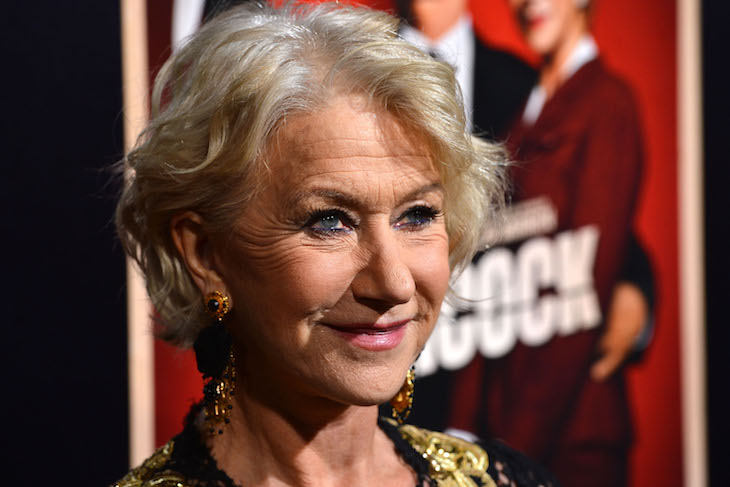
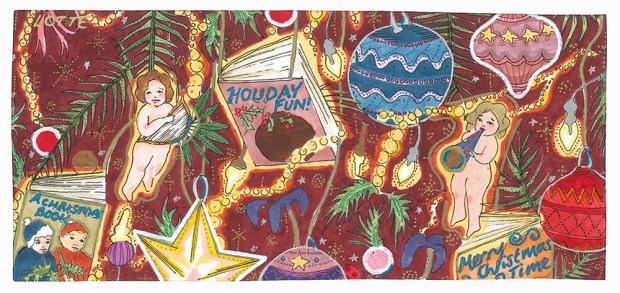
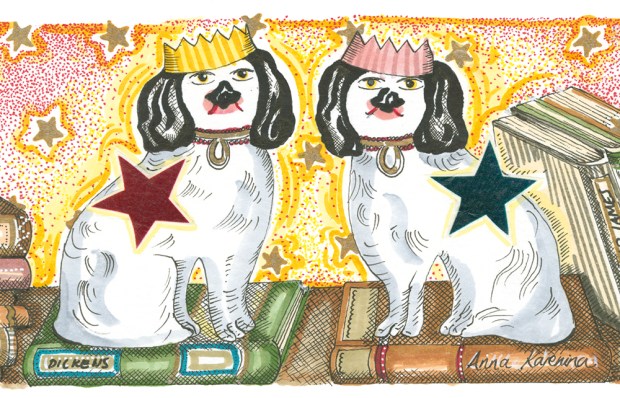
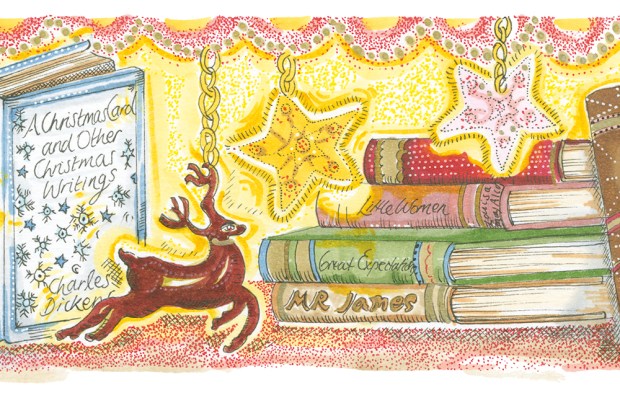
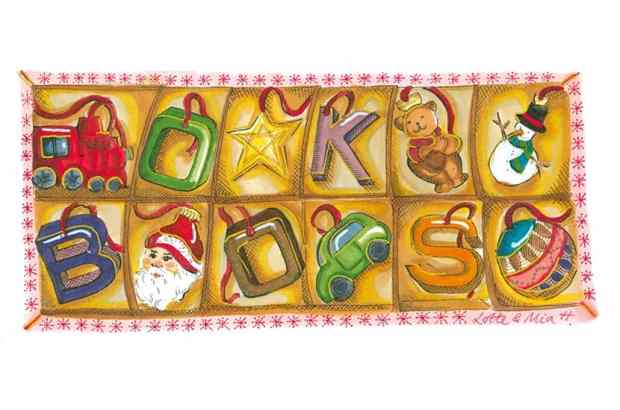
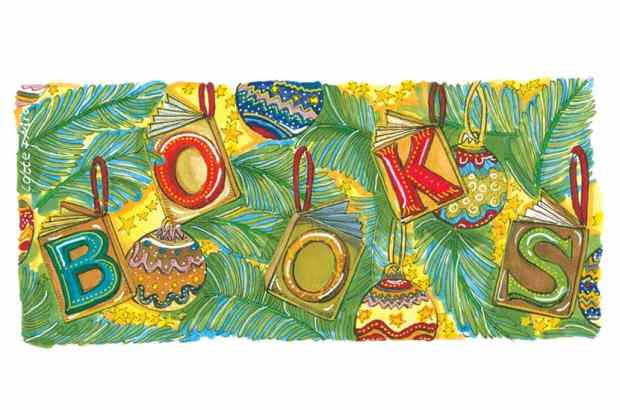
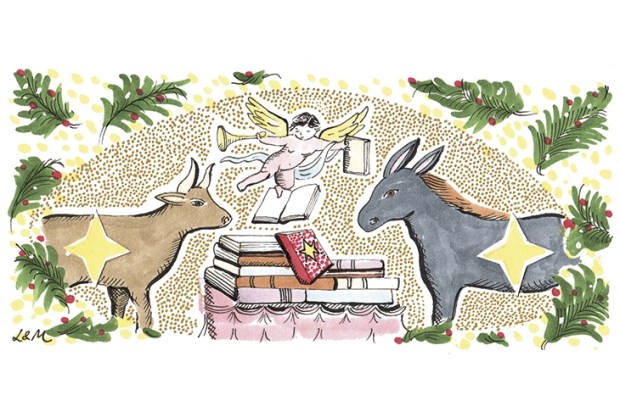






Comments
Don't miss out
Join the conversation with other Spectator Australia readers. Subscribe to leave a comment.
SUBSCRIBEAlready a subscriber? Log in